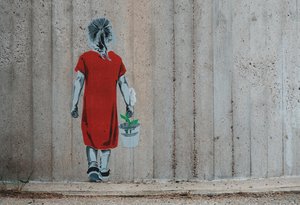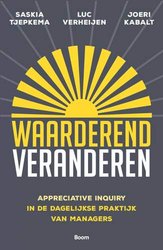
Strenghtening what works
Appreciative Inquiry (AI) is a change vision and strategy. The underlying concept is that a system develops in a positive way when people together start to investigate what works and what they want for the future. Based on those conversations, the people involved explore ways to use their strengths and move towards a future that seems worthwhile to them.
Systematic inquiry into strengths makes connections grow: it inspires new visions of the future and it generates the energy for making this future come true. AI helps to mobilise and connect the diversity of knowledge, proficiencies and interests. That makes for an ideal and fertile ground for new social and organisational solutions that are supported by (large) groups of stakeholders.
Both words in "Appreciative Inquiry" are important:
- appreciative means that there is a continuous focus on those things that you want to see more of.
- inquiry says something about the approach: it is an invitation to people to become investigators of their own practices and to collaborate in sustainable change.
Within Kessels & Smit, many consultants work on projects that are based on Appreciative Inquiry. We also write about AI, do research on it and educate people about this change philosophy.
We collaborate in many activities with the Case Western Reserve University in Cleveland, the birthplace of AI. Together with pioneers like David Cooperrider and Ronald Fry, we facilitate the Appreciative Inquiry Learning Networks in Flanders. Kessels & Smit was also the co-initiator of the 5th AI World Conference in Ghent in 2012.
Related cases
-
 Towards a culture of caring
Towards a culture of caring
Dialogue and meaning-making as catalystsThe manager of a University Hospital dreamt of, what he called, ‘a culture of caring’. With care as a central element, in a number of ways. Patient care, care for each other as colleagues, and self-care: resilience and personal attention. His question was: How do we get people on board for this idea in a large organisation? How do we translate a broad concept as ‘a culture of caring’ into concrete daily work practices? Approach Over the course of a few years we supported this culture development with a range of activities. For example, we organised World Cafés with all managers on how they - in their role - enable a culture of caring. In sessions with the strategic management team, we searched for leadership strategies for them to include an organisation of 6,000 employees in this story. And once a year, a 'Day of Dialogue’ is organised, in which 250 employees from very different roles and departments, have in-depth conversations with each other about care, values and culture. ... ›› -
 Developing a shared vision on the future of education
Developing a shared vision on the future of education
Shaping a national dialogueThe Flemish Minister of Education wanted to develop a new guiding vision and corresponding concepts for education. A strong and attractive image for the future that would also offer solutions to current problems. And that could serve as a North star: setting the course for shaping concrete improvements and innovations in the entire field of education. The benchmark was set for 2030. And the central question was: what future do we see for education in our society if we look that far ahead? Approach The project, which started in 2012, had four phases: analysis, design, participation and dissemination. We supported the first three phases. ... ››
